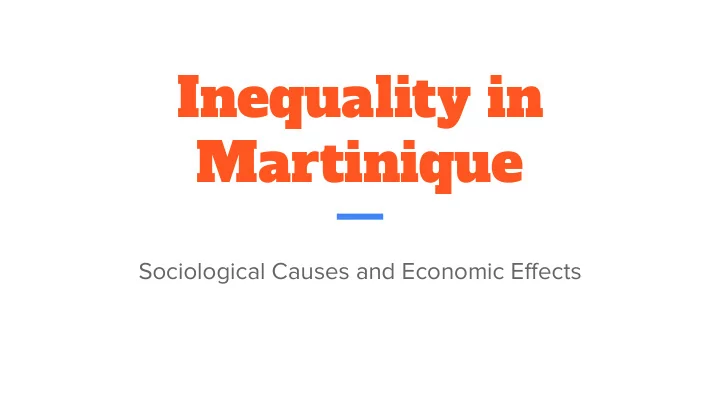

Inequality in Martinique Sociological Causes and Economic Effects
What is Martinique? A French department ● ● 385,000 inhabitants ● Economy based on services (82.4% wealth) Historical development based on slavery ●
Viewpoint: income&wealth inequality Few figures by INSEE (French National Institute of Statistics) Most focus on income inequality Yet, wealth inequality is more relevant because inequality was inherited from slavery era (unequal land and means of production distribution) Two different angles: inequality between Martinique and Continental France ● ● Inequality within Martinique
3rd poorest department in France Continental France Martinique Unemployment 9.8% 21% Illiteracy rate 3.4% 17% Gini coefficient 0.30 0.47 Figures: INSEE 2013
Why is Martinique poorer and more unequal? Two main causes: ● Cost of living : 17% higher than Continental France because of import laws ○ Imports 3x more than it exports (manufactured goods vs. agricultural products) Expensive staple goods ○ ● Maintains an unequal social structure based on race : only wealthy families can allocate resources to education
Inequality within Martinique 1% of the population owns 52% of the land Characterized by an urban/rural opposition: 65% of income concentrated in Fort-de-France and its suburbs.
A socio-racial hierarchy inherited from slavery Defined by social statuses based on race: Békés : white landowners (the 1% mentioned above) ● ● Mulâtres : colored bourgeoisie ● Noirs : Blacks and mixed-race Martiniquais ● Other groups: Chinese and Indians.
Is it getting better? Inequalities have worsened since 2000. Most Béké families have been managing the island since before the French Revolution ! In Continental France, little political concern: having a race debate is philosophically impossible in France. Strikes : several-week-long since 2009, in Martinique and other similar French territories (Guadeloupe and French Guiana).
Conclusion Inequality rooted in history: economy managed by Békés => the social structure needs a revolution that does not come. A type of racism France does not want to acknowledge: “ In mixed-raced families, children have different skin colors and that’s not harmonious. We have always striven to preserve our race. ” Telling example of a post-slavery society pursuing equality: a microcosm that sums up any post-slavery society problems. Who will wake Martiniquais up?
Recommend
More recommend